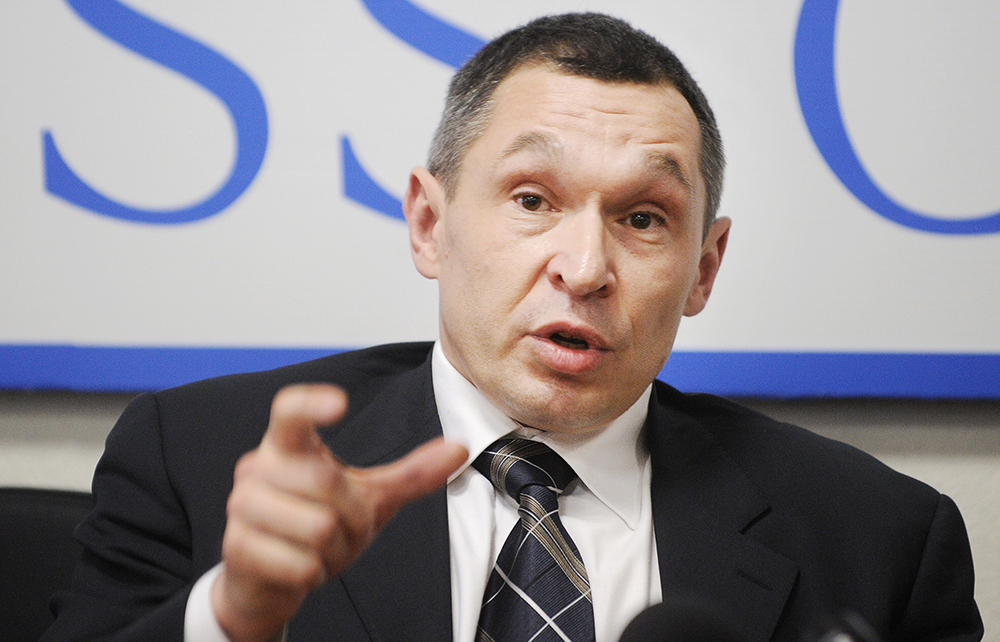Imagine: it’s 16 December 2004 and you are a middle-ranking banker living in Moscow – prosperous but ordinary, a long way below oligarch level. You are looking forward to a New Year’s trip with your family to Prague – the hotel is booked; your young son is excited. Your phone rings while you are at lunch: an investigator whom you’ve never heard of asks you to come and answer a few questions. You ask if tomorrow will do. ‘No, you must come today,’ insists the caller. ‘It’ll take around 20 minutes.’ What do you do?
If this were the beginning of a thriller, Vladimir Pereverzin would have instantly made his way to the secret lock-up with the false identity documents and gone on the run. As it was just an ordinary day in a so far ordinary life, however, he trotted over to meet the investigator at the ministry for internal affairs. And so began an incomprehensible, hallucinatory, seven-year nightmare. Arrested, searched, threatened by a drunk cop and told to confess, Pereverzin still couldn’t understand what it was he was being accused of. Finally his interrogator came clean. ‘We’re not interested in you. Give us a statement against Brudno, Lebedev and Khodorkovsky, and you can go home and live your life.’
From 1998-2002 Pereverzin had worked for Yukos, the oil company owned by Mikhail Khodorkovsky, one of the richest men in Russia and the only oligarch to campaign for free speech and pluralism. In 2003 Khodorkovsky was arrested, tried and given a nine-year sentence – a ‘Kafkaesque procedure’, as Masha Gessen called it. Many of the ‘crimes’ he was accused of were either criminalised after the event or were perfectly legal. At the same time ten others were picked up, including poor Pereverzin: the most random victim of the Yukos case, he’d never met the owner, nor the other employees with whom he was meant to have conspired. He refused to give false evidence. Despite the lack of proof, Pereverzin was found guilty of embezzling $13 billion and laundering $8 billion. He got 11 years in the camps.
Russian prisons have often been described as a microcosm of the country as a whole. This book, written in 2013 and now skilfully translated by Anna Gunin, is evidence of just how far towards total dictatorship Russia had advanced even then. The corruption and arbitrariness of the Russian legal system itself seems unchanged since the days of Solzhenitsyn’s Gulag Archipelago. In Pereverzin’s case, there was a political motive for finding him guilty; judging by the many examples he gives, however, it seems that blatant falsification is endemic even in ordinary criminal cases. ‘There is no presumption of innocence… [which is] evident in the paltry number of acquittals.’ In countries with the rule of law, about 20 per cent of trials end in acquittals. In Russia, the authorities don’t bother with such niceties. If a confession is not forthcoming, no matter. ‘You can be charged with the most monstrous, unthinkable crime and be convicted without any evidence.’ Pereverzin’s guess is that around 30 per cent of the prison population is innocent, hence the Russian proverb: ‘Poverty and prison can befall any man.’
Once Pereverzin arrives in his first camp, he discovers that in some respects the system has moved with the times. Whereas in the 1930s and 1940s the camps were designed to provide slave labour for industrialisation projects, in these capitalist days camp officials use their free labour to run all sorts of private side hustles – manufacturing breeze blocks, painting portraits, making portable barbecues, socks or shoddy furniture. Just as in Soviet times, the ‘thieves-in-law’ or criminal hierarchy control some of the camps. In Pereverzin’s experience, they seem to do it rather better than the authorities, so long as you are not a snitch or a paedophile or gay.
Most of the prison population aren’t gangsters, just utterly brutalised, ignorant, alcoholic or drug-addicted recidivists. People who’ve whacked their neighbour with an axe during a drunken argument, or killed their wife while on a bender, or beaten a shopkeeper to death for a few thousand roubles. These are the men who are now being sent to the ‘meat-grinder’ – the front lines in Ukraine. They are the ones terrorising the occupied Ukrainian territories as well as their hometowns on their release.
Pereverzin tells their stories with a laconic wit; but survival in this unpredictable and violent world is not a given. It helped that he was physically strong and that he had money – not the billions he was accused of taking, but a lot compared with his fellow inmates. The Prisoner makes my heart sink for all the opponents to the war who have been jailed in Russia in the last couple of years, many of them old and frail. Pereverzin had a bit of luck in 2012 when, due to a change in the law, he was unexpectedly released after seven years and two months. It seems unlikely that today’s political prisoners will be so fortunate.







Comments